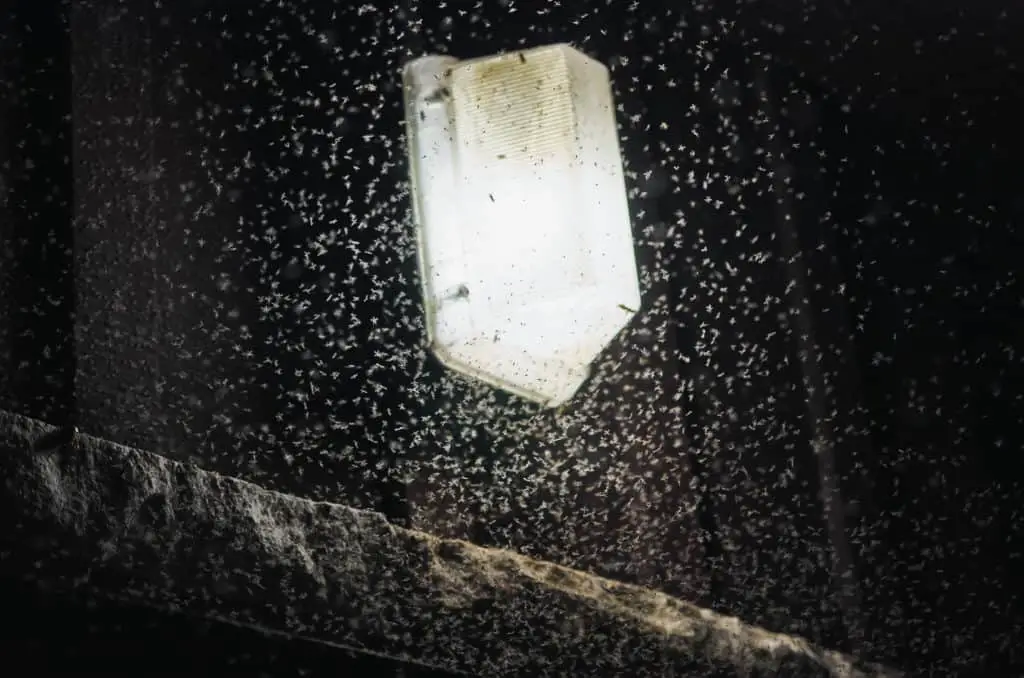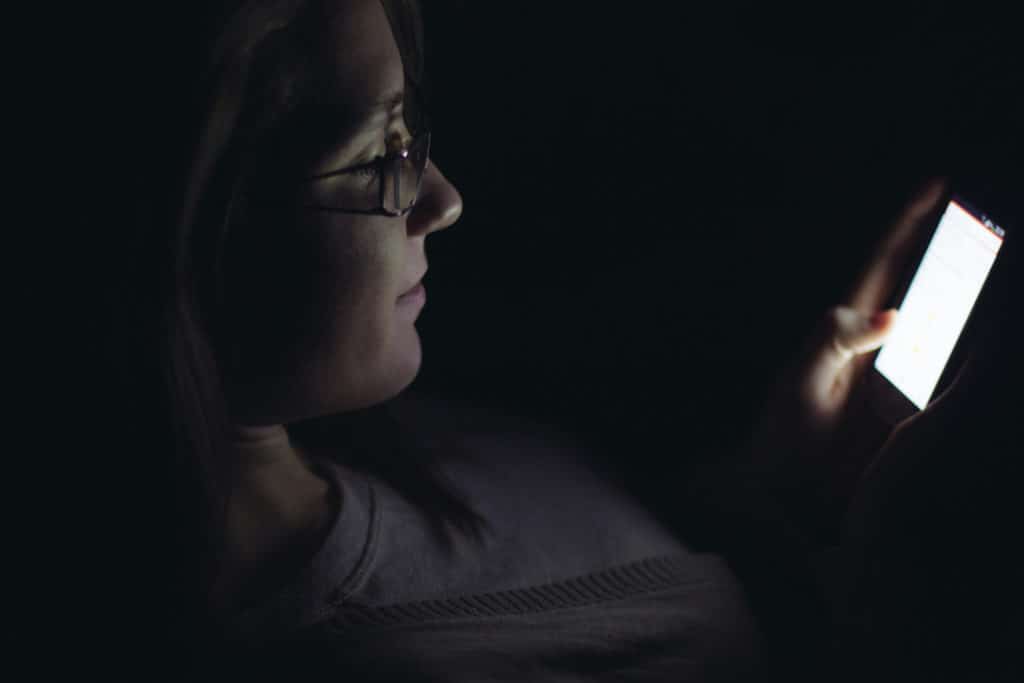Whilst sitting outside trying to enjoy a warm spring evening I was being pestered to death by mosquitoes. Apart from waving my hands around like a madman I decided to do something about it and got up to turn the outside light off. Feeling rather smug I sat down but my girlfriend turned to me and asked, “Do LED lights attract mosquitos.”
My smugness faded pretty quickly as I had to admit I wasn’t sure. Therefore this post is my investigation into this question and the expert opinions I could gather on the topic are all bundled into one handy post. Hopefully, this will help others not have their pleasant evenings ruined by the flying, biting pests!

Do LED Lights Attract Mosquitoes?
Surprisingly, mosquitoes are not attracted to light or repelled by light. Instead, the flying insects use light as a navigational tool while on the hunt. Moonlight and starlight offer enough illumination to help mosquitoes get from one place to another or follow a pathway that has become a regular travel route.
These bugs can see, but their vision is more blurred than clear. Because of the visual impairment, mosquitoes learn and remember what scent their prey emits, another tool used to aid in navigation and hunting.
Anyone who has visited a building at night that uses outdoor lighting will know that insects, including mosquitoes, are a problem and concern. The number of bugs flying around lights can be a pain for guests and customers trying to get in or out of a building. Lightbulbs that produce heat and UV rays will confuse mosquitoes and deter them from their original destination to swarm the lights instead.
LED lights are becoming more popular among home and business owners due to their longevity and brightness as well as the price per bulb. When comparing traditional light bulbs to LED bulbs, the major difference that will attract mosquitoes is the wavelength being let off and the amount of heat that each bulb generates.
The longer the wavelength and the warmer the colour tone, the less likely a mosquito is to be attracted. In contrast, the shorter the wavelength and the cooler the colour tone is, the more likely a mosquito will be drawn in and swarm the area.
Traditional lights, such as incandescent and halogen bulbs, use cooler tones and shorter wavelengths that emit a more considerable amount of heat, increasing the number of bugs that will swarm the light. Not having a clear visual field, the increase in heat will further confuse mosquitoes to think a food supply is nearby. LED lights produce less heat, making insects less interested in swarming the area.
Mosquitoes behave similarly to nocturnal creatures. It is not uncommon to be bit by a mosquito during the day, but the chances of a bite are much higher during the early morning and evening hours. While they are not known to have sleeping hours or schedules like other nocturnal animals such as bats, mosquitoes typically choose to rest during daylight since the excessive amount of light can confuse the small insects.
What Colors Keep Mosquitoes Away?
Knowing that mosquitoes are attracted to cooler tones and shorter wavelengths that can be found in the 300 to 650-nanometer range, the opposite should work to keep mosquitoes away. When buying new lights, look for packaging that specifies lights in the 400 to 800-nanometer range.
These lights have warmer color tones from violet to red but do not include UV light that attracts most insects. The longer wavelengths that come from lights in this specific range are less visible to insects, resulting in fewer bugs. If the packaging on newly purchased lights mentions orange, red, or yellow, you can feel confident in your selection.
Are Mosquitoes Attracted to Blue Light (Phone Light)?
Mosquitoes are attracted to green, blue, and UV lights above all others. These colours are in the cooler part of the colour range but tend to emit more heat than their opposites. Cell phones use short and low wavelengths when the screen is on and lit up. The short wavelengths are more visible to mosquitoes and let off more heat.
Cell phones that have been used for extended periods will generally begin to increase in temperature, along with the user’s personal warmth shared between the device and themselves. The trifecta from all the heat sources and the blue light can cause mosquitoes to misinterpret the temperature variation as prey.

Are Mosquitoes Attracted to UV Light?
Mosquitoes are not attracted to UV light any more than other cooler colour tones that are visible to them. However, UV lights that are used in bug zappers will attract mosquitoes if it is the only light source that can be seen in the area where a mosquito currently is.
UV light becomes visible around 350 nanometers. It is within the visible spectrum of mosquitoes and can cause confusion on the hunting path due to the heat emitted from the shorter wavelengths. While some mosquitoes will be attracted to the UV light commonly found in bug zappers, the device is not as effective as believed to be against mosquitoes.
Approximately one in twenty bugs that get zapped will be a mosquito. There are numerous other bugs that are more attracted to UV lights and will be the victim of electrocution by bug zappers more times than mosquitoes will be.
Do LED Mosquito Lamps Work?
Since LED lights do not attract mosquitoes as easily as traditional incandescent or halogen light bulbs do, there are pros and cons to LED mosquito lamps. Like commonly seen UV light bug zappers, most of the insects being zapped are not going to be mosquitoes, but instead less harmful and potentially beneficial bugs that are tricked by the lighting effects.
Since LED lights are optimal for keeping mosquitoes at a distance, the LED and UV combination could ultimately repel more mosquitoes than attract. On the plus side, though, any mosquito that is confused or curious enough to get close to a UV bug zapper or an LED mosquito lamp will be handled accordingly.
LED bug zappers and mosquito lamps attract insects using Ultraviolet light to confuse the mosquitoes. The lamps consist of both a UV light and an LED light. The combination of the lights will provide a quieter device in comparison to traditional bug zappers. It will have a smaller cloud of bugs surrounding it as the LED operates on longer wavelengths.
Another benefit of mosquito lamps is that LED lights have a longer life span than incandescent lights and will require little to no upkeep or repair while being used, other than needing to sweep away dead insects in the morning.
Final Thoughts
It seems that the answer to the question, do LED lights attract mosquitos? is ultimately, no. Other more traditional lamps give greater heat and different wavelengths that are more useful to the mosquitos. However, other bugs and insects such as spiders are attracted to LED lights, but for reasons different to what you may think.

